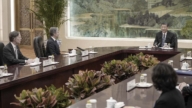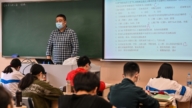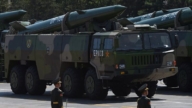【新唐人2013年11月07日讯】中共十八届三中全会即将在11月9号召开。有报导说,日前,中共宣传部门大力宣传“改革”的旗号,试图用“改革”来进行所谓的“正能量”宣传。分析指出,不解决迫害法轮功的问题,中共所讲的一切改革都是空谈。
三中全会前夕,中共当局不断加大宣传“改革”的力度,当前,中共高层以“改革力度空前”来造势。
同时,国资委日前提出,“国企改革方案”争取在三中全会后推出。而最新一期英国《经济学人》杂志的封面文章断言,中共的三中全会,如果能够在“国企改革”和“农村土地制度改革”这两个领域大胆突破,说明这样的变革“意义重大”。
从被指为“改革路线图”的“383方案”来看,新一轮改革,具体内容包括土地改革、户籍改革、金融改革、简政放权,甚至可能还有检察与司法部门由中央垂直管理等等。
《美国之音》报导,“改革”一词,被中共滥用了三十年,现在在中国大陆民众的眼里,“改革”已经成了一个肮脏的字眼,成为中共及政府官员坑害民众,为自己谋私利的代名词。
“北京思源社会科学研究中心”总裁曹思源,曾就职于国务院办公厅和国家经济体制改革委员会,他表示,政治和经济改革不配套,将付出惨痛的代价。
北京思源社会科学研究中心总裁曹思源:“从现在的情况看来,没有关于政治改革的部署,国务院经济研究中心的改革方案,‘383’都是指经济,没有讲到政治改革,关系到十三亿人口的前途,代价是改革失败,经济停滞,人民遭殃!”
由于去年2月,前重庆市公安局局长王立军夜逃美领馆,欲求政治庇护,拉开了中共政局巨变的序幕。紧接着,围绕前重庆市委书记薄熙来的案件,令中共高层与前党魁江泽民派系之间,展开了一场激烈 的权斗。目前中共高层分裂公开化,政局动荡。
据美国《大纪元时报》报导,中共意识形态的破产,使得保持经济的持续增长成为中共执政合法性的唯一手段。而面对内外交困的政治经济形势,中共政权被迫释放出中共十八届三中全会将启动深化经济改革的信号。
时事评论员夏小强指出,中共在上个世纪所启动的改革开放经济改革政策,使得文革结束后面临崩溃的中国经济恢复运作,同时也让中共暂时摆脱了亡党的危机。
时事评论员夏小强:“但是,当时中共并没有启动经济改革所需要的配套措施——政治体制改革,因而使得中共的这种高速经济发展从一开始就是畸形的,经过三十多年的经济发展,中共这种以践踏人权、破坏环境、过度消耗资源为代价的经济发展模式,已经走到了尽头。”
夏小强指出,中共政权走到今天,早已经失去了政治改革的机会。别说政治改革,就连如今习、李政权所期待的经济改革,都已经不可能成功。此外,真正阻止中国经济改革不能成功的原因,夏小强认为是中共对法轮功的迫害。
夏小强表示,江泽民在1999年发动对法轮功的迫害后,一直害怕遭到清算,因此试图长期安排心腹和有迫害血债的人,掌控中共核心权力。迫害法轮功,江泽民动用了全国所有的人力、物力和财力,其中政法委每年公开的维稳费用,超过了军队的费用,高达7,000亿。
夏小强:“现政权所有经济方面的改革,都将触动江泽民集团的利益,使江泽民集团失去对中国经济命脉的控制,需要花费天文数字金钱,维持对法轮功的迫害就难以为继,而一旦迫害停止,手中沾有血债的江泽民集团将会受到清算。因此,习、李政权在经济领域的任何改革动作,将会受到江系集团的反弹。”
夏小强指出,中共对法轮功的迫害问题,成为最高当局无法避开的关卡。涉及数亿人的法轮功问题不解决,迫害法轮功的血债帮不清除,现任当权者的任何改革都是自欺欺人,无论做什么,都是白做。
采访编辑/常春 后制/李勇
Are Reforms Empty Talk Ahead of CCP Third Plenary Session?
The Third Plenary Session of the Chinese Communist Party
(CCP) 18th Central Committee is scheduled for November 9.
The Propaganda Department is promoting
a positive energy through the talk of reform.
However, it is analyzed that any reform is just an empty
talk, as long as the persecution of Falun Gong continues.
Ahead of the Third Plenary Session,
the CCP is rallying on issues of reform.
The state audit department, SASAC, proposed reforms of
state-owned enterprises, to be launched after the Plenum.
The latest issue of The Economist suggests it
will be significant if land reforms, and reforms
of state-owned enterprise are achieved.
The reform blueprint, or “383 plan", includes
land reform, reforms in household registration,
financial reforms, decentralization, and centralising
the governing of prosecution and judicial departments.
Voice of America reported that reform has
been misused by the CCP for over 30 years.
To the Chinese people, reform is a dirty word for
officials to fulfill their own interests and entrap society.
Cao Siyuan, CEO of Beijing Siyuan Social Science
Research Center was also a member of the
economic reform committee at the State Council.
He highlights the horrible price when economic
reform and political reform are incompatible.
Cao Siyuan: “Under current circumstances,
there is no plan for any political reforms.
The 383 reform program at the Economic Research
Center of the State Council refers to economic reform.
Political reform matters most to
the future of the 1.3 Billion people.
The reform failure will only lead to economic
stagnation and it’s the people who will suffer."
The recent unfolding of CCP political upheaval ignited
in February last year, when Wang Lijun, former head
of Chongqing Municipal Public Security Bureau, fled
to the U.S. Consulate in Chegndu, seeking political asylum.
The subsequent trial of former Chongqing Party Secretary
Bo Xilai was surrounded by a fierce power struggle.
This struggle took place between the current Xi Jinping
leadership, and the faction lead by Jiang Zemin.
The split in the central CCP is now open.
U.S. based Epoch Times reported that the Communist
ideological bankruptcy has forced the CCP to focus on
economic growth, in order to sustain its ruling legitimacy.
Facing difficult political and economic situations, the
regime is forced to try to launch deeper economic reforms.
Political commentator Xia Xiaoqiang says that economic
reforms and policies of opening up helped to restore
China’s economy after the Cultural Revolution.
This seemed to save the CCP from the brink of collapse.
Xia Xiaoqiang: “However, political reform
did not follow with the economic reforms.
The rapid economic development of the
country has started off the wrong foot.
30 years later, economic development is at the cost of
trampling on human rights, environmental destruction, and
over-consumption of resources, and is coming to a dead end."
Xia Xiaoqiang suggests that the CCP has
completely lost the opportunity for political reform.
Xi and Li’s economic reforms are unlikely to succeed.
He believes the main reason to impede reforms in
China is to continue the persecution of Falun Gong.
Xia Xiaoqiang explains that since Jiang Zemin
launched the persecution of Falun Gong in
1999, he has been in fear of facing trial.
Therefore, he’s arranged confidants and people involved
in the persecution to control the core power of the CCP.
In order to persecute Falun Gong, Jiang Zemin
employed the resources of the whole regime.
This included human, material and financial resources,
with some estimates of as much as 700 billion yuan
spent annually on the Politics and Law Committee.
This far exceeding spending on the military.
Xia Xiaoqiang: “Any economic reforms will affect
Jiang’s faction in controlling China’s economic lifeline.
With these astronomical expenditures, it will be impossible
for Jiang to be able to sustain the persecution of Falun Gong.
Once the persecution stops, Jiang’s faction will
have to face the consequences of their actions.
Therefore, any economic reforms by Xi and Li’s
leadership will meet obstacles from Jiang’s faction."
Xia Xiaoqiang points out that the CCP’s
persecution of Falun Gong has become
the unavoidable checkpoint for the regime.
As long as the Falun Gong issue is not resolved,
which involves hundreds of millions people, and
as long as Jiang’s faction is not disbanded, any
reforms areself-deceiving and ultimately futile.
Interview & Edit / Chang Chun Post-production /





























